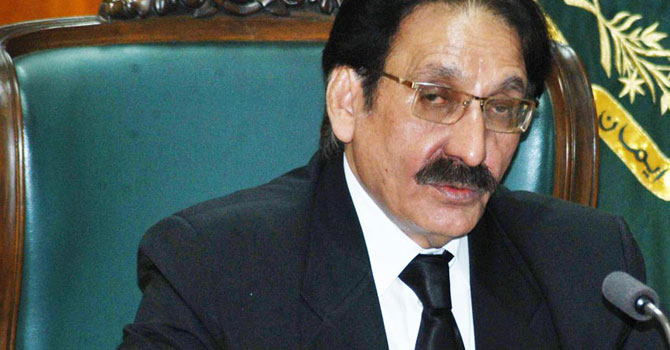
ISLAMABAD: Feeling the heat of the much-criticised remarks made by some judges, including the chief justice, over the role of the opposition in parliament during the passage of the new contempt law, the Supreme Court on Monday tried to pacify the parliamentarians and said the court always sought wisdom from them.
“They (parliamentarians) are not against us. We seek wisdom from them and when during the proceedings we read the debate made in the two houses we learn about the discussion on every aspect of the law,” observed Chief Justice Iftikhar Mohammad Chaudhry who heads a five-judge special bench hearing a set of identical petitions challenging the Contempt of Court Act, 2012.
On July 27, members of the treasury benches in Senate had expressed concern over the judges’ remarks and said the judiciary should exercise restraint in dealing with the parliament.
Earlier, Leader of the Opposition in the National Assembly Chaudhry Nisar Ali Khan of the PML-N had, in a hard-hitting statement, described the remarks as disappointing, unfair, unjust and beyond comprehension.
Although the opposition had walked out of the house during the vote count before the passage of the contempt law, its members had participated in the debate, the chief justice recalled.
“Some of the speeches by treasury members like Raza Rabbani and Aitzaz Ahsan were the best; even Senator Haji Mohammad Adeel spoke so well though he did not have a legal background,” Justice Tassaduq Hussain Jilani said.
“Although certain parts of Haji Adeel’s speech were very critical towards the judiciary, that’s the right of the parliamentarians,” Justice Jawwad S. Khwaja said, adding that Articles 68 and 69 of the Constitution barred the judiciary from looking into whatever was said on the floor of parliament. “Like us they also enjoy the constitutional protection,” he said.
However, the court said it was their (parliamentarians) right to express their point of view but it should be made with decency in a respectable manner without being personal.
“The thing this country needs the most is to relive our values,” the chief justice observed. He acknowledged that things had started improving which was evident from the fact that members of civil society had approached the Supreme Court by filing petitions against the new contempt law. Pakistan Bar Council Vice-Chairman Lateef Afridi, representing the council, said the tension between the executive and the judiciary was not new in Pakistan; the difference of opinion between the two institutions had a long history and existed even in India.
“This sort of a cold war is not something new.”
“It’s kind of a hot war,” Justice Khwaja said.
The chief justice observed that it was a good thing that awareness was being created among people about their rights and they had started taking interest in parliamentary debates and judicial proceedings. “These are the issues which at the end of the day strengthen democratic order in the country,” he said, adding that discussions and debates even among people and in the media were healthy signs, a sign of changed attitude and a method to understand and evolve consensus.
Mr Afridi explained that the new contempt law was the product of a peculiar circumstance and, therefore, it should be considered against this background. Unfortunately, he said, democracy was in its infancy in Pakistan and so was the judiciary because dictators had ruled the country for more than half of its history.
Citing a number of examples from the judicial history of India, the counsel said the underlining need was to create an impression as if the Supreme Court was playing the role of a doctor and cases were brought to it like a patient for treatment.
When Justice Khilji Arif Hussain observed that people had become aware of their rights, Mr Afridi retorted that the message should be that the patient being taken to the doctor was not for killing but for treatment unless amputation of a limb was necessary because of a cancer.
Since the court had no option but to strike down the entire law for being inconsistent with the fundamental rights, he said the government should be asked to promulgate an ordinance to repeal the new contempt law and then introduce an amended law in parliament.
Advocate Shakoor Paracha, who represented the federation, informed the court that the federal government had stopped him from submitting any written statement and asked him to argue the case only on legal points.
He will commence his arguments on Tuesday.
When Shahid Orakzai was arguing the case, the chief justice observed that every person against whom a judgment was passed became the enemy of justice system. Only those people liked the judges who had received a favourable verdict in a case, he said.











































Dear visitor, the comments section is undergoing an overhaul and will return soon.